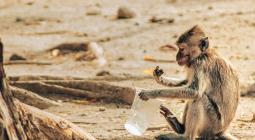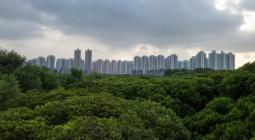We’ve overexploited the planet, now we need to change if we’re to survive
The relationship between humans and nature is under intense and increasing strain. The report released today by Ipbes, the Intergovernmental Science-Policy Platform on Biodiversity and Ecosystem Services (akin to the IPCC reports on climate change), provides compelling evidence that humans are overexploiting wild species and habitats. Harmful activities, including habitat destruction, poor farming practices and pollution, have altered ecosystems significantly, driving many species past the point of recovery. In Great Britain alone, of the 8,431 species assessed in the 2019 State of Nature report, 1,188 are threatened with extinction. Globally, there are an estimated one million at risk, with biodiversity declining at a faster rate than at any time in human history.
We cannot ignore biodiversity loss. Biodiversity is the variability that exists among all living organisms, between different species, within species including genetic makeup, and in wider ecosystems. Billions of people rely on wild species for food, clean water, energy, income and health and wellbeing. Annually, crops worth up to £480bn are pollinated by a variety of wild animals, and an estimated 4 billion people depend on natural medicines for their healthcare. These vital ecosystem services are fundamentally based on a healthy environment, and this requires biodiversity. Losing biodiversity leaves species and ecosystems less resilient to challenges such as invasive species or pests, meaning there is an increased risk of whole populations being wiped out and destabilising the entire ecological network. Nature is a finite resource, and human self-interest alone should determine that biodiversity must be protected.
Alongside overexploitation, humans are driving biodiversity loss by destroying, polluting and fragmenting habitats across the globe. Many of the UK’s important peatlands, which provide a home for rare species such as the hen harrier, have been drained for agricultural use. The Amazon rainforest is being cleared to such an extent that it may be near a tipping point beyond which it cannot recover.
Nature is a finite resource, and human self-interest alone should determine that biodiversity must be protected.
The climate crisis is exacerbating the issue. Many species simply cannot adapt to the scale and pace of changing temperatures. For example, warming seas and ocean acidification are devastating coral reefs around the world. This year, the Great Barrier Reef suffered its sixth mass bleaching event since 1998 with more than 90% of reefs affected. In many cases, when an ecosystem loses biodiversity, it becomes less able to store carbon, contributing to further climate change. We have a vicious cycle: climate change leads to biodiversity losses, which in turn leads to further climate change. As governments around the world develop plans to reduce carbon emissions and conserve biodiversity, the message is simple: we must solve both problems together.
What can be done? Just as science has diagnosed the problem, it can provide solutions. Using strong evidence, such as this Ipbes report, governments can develop effective policy. Integrated and collaborative planning can deliver sustainable solutions which address climate change and biodiversity loss simultaneously, protecting and enriching human lives.
In southern India, scientists, Indigenous communities and local government have worked collaboratively to protect and restore mangrove forests. The trees’ interconnecting large-root systems offer protection against rising sea levels, provide habitats for fish and crustaceans, and clean surrounding water. The trees also draw and store carbon from the atmosphere and encourage carbon-rich sediment deposits. The increase in wildlife has benefited small scale fisheries and tourism. Innovative and effective nature-based initiatives such as these could be implemented throughout different landscapes across the planet.
There are also simple day-to-day things we can do to benefit our environment; for instance, reducing food waste. Currently about 30% of all food produced globally goes uneaten, meaning a significant proportion of the resources, and importantly the land used to grow, process, pack and transport it, is wasted and less able to support biodiversity.
Political will and leadership are needed, and the 15th UN Convention on Biological Diversity conference in December, CBD Cop15, provides the next critical opportunity for governments to commit to real ambitious change.
CBD Cop15 could deliver landmark action and be as important for biodiversity as the Paris Agreement is proving for reducing greenhouse gas emissions. It will set the direction for the next decade of international action and beyond. Governments should agree to halt and reverse biodiversity loss by 2030, and develop evidence-based, actionable plans to do so. An important challenge is to define a reliable and simple integrated metric, like carbon emissions have been used for climate goals. At the end of June, negotiators met in Nairobi for their latest attempt to agree the Post-2020 Global Biodiversity Framework, and while progress was made, it did not go far enough.
The last decade’s targets were not met; the next decade’s must be. Credible delivery plans will be required, and we need a robust mechanism for monitoring progress and holding ourselves to account. CBD Cop15 is the time to finalise the framework, and countries must come to the table prepared to make and support ambitious commitments. This is our chance to secure long-lasting agreements to protect our planet.
-
Sir Patrick Vallance is the UK government’s chief scientific adviser




